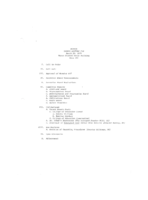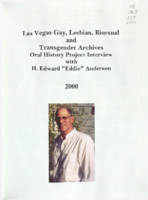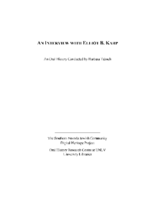Search the Special Collections and Archives Portal
Search Results

Meeting minutes for Consolidated Student Senate, University of Nevada, Las Vegas, March 20, 1979
Date
Archival Collection
Description
Text

Interview with Stephen Craig Ronshaugen, November 26, 2004
Date
Archival Collection
Description
Text

Transcript of interview with Edward "Eddie" Anderson by Dennis McBride, October 11-14, 2000
Date
Archival Collection
Description
Dennis McBride interviews Eddie Anderson (born 1946) about his role in advocating for LGBT rights, specifically his participation in the various political and social movements during previous decades. The interview begins with a discussion of Anderson’s background, including his experiences growing up in children’s homes and living with his grandparents. Anderson mentions marching with his grandparents for both workers’ and women’s rights as some of his first political involvements. Anderson also discusses his original aspirations for becoming a priest as well as his memories of meeting President John F. Kennedy during a visit to his high school when Anderson was student body president. Anderson then discusses travelling to the South, specifically in Selma, Alabama, during one summer while in high school in order to help register Black voters. Anderson then discusses his friendship with Nevada Senator Bill Raggio and his wife, and his joining of the U.S. Navy, where he met President Ri
Text

Transcript of interview with Elliot B. Karp by Barbara Tabach, December 17, 2014
Date
Archival Collection
Description
Interview with Elliot B. Karp by Barbara Tabach on December 17, 2014. In this interview, Elliot Karp discusses growing up in a culturally Jewish household in New York and becoming more observant in his teenage and college years. He decided, after a trip to Israel and a year in a rabbinical program, that he wanted to be a "Jewish professional" with a focus on social work and community organizing, and attended a Master's program at Brandeis University. Karp goes on to talk about his work for the Jewish Federation in Ohio and Pennsylvania, and being recruited to come to Las Vegas. He talks about the challenges in the Las Vegas Jewish community and the Jewish Federation's role as an umbrella organization to partner with other agencies to grow and sustain a robust Jewish community in Southern Nevada.
On October 6, 1955, Elliot Karp was born in Mineola, New York to parents of East European heritage who identified as culturally Jewish. As a teenager, Elliot felt the calling to become kosher, balancing this practice with household norms that were not as strict. He eventually became shomer Shabbat just after enrolling at State University of New York at Stony Brook, where he majored in Political Science. After graduating from SUNY, Elliot spent a year living in Israel considering a path in rabbinical studies. By the end of his time, he decided on a different, yet related path, and registered as a graduate student in Brandeis University's School of Jewish Communal Service, on fellowship from Council of Jewish Federations. After graduating, Elliot moved to Columbus, Ohio to work for the Jewish Federation, focusing on fundraising, but was exposed to many different operational areas of the organization. After three years, Elliot was recruited to the Philadelphia office as its director of leadership development. He then left the Federation to work in development at Brandeis University, but after two years, returned to the Federation as the Cincinnati office's chief development officer. In 2008, Elliot received a call to take his highly cultivated leadership and fundraising skills to another Federation office: Las Vegas. After much consideration, he took the job - and challenge - as the office's new chief executive officer. Since then, Elliot has done much to promote communication, coordination and collaboration within the local Jewish community and beyond, through relationship building and successful fundraising efforts. His ultimate desire is to expand funding for programs that get more people involved in Jewish life - while also empowering community members define what a Jewish life means for them.
Text

Transcript of interview with Christopher Maestas by Claytee White, September 14, 2008
Date
Archival Collection
Description
Christopher “Chris” Maestas (1965-2009) was an engaged educator and leader within the Chicano, Latinx, and Henderson communities. As he traced back his Latinx heritage, he explored his father’s hometown in Llaves, New Mexico, where he and his family were discriminated for their non-white demeanor; and his mother’s paternal Spanish roots; his grandfather came to work in Henderson, Nevada at the Basic Magnesium Industrial (BMI) plants during World War II. The Chicano and Spanish cultures played a significant part in defining his role within the community. For Chris, Chicanos were “people that lived in the southwestern United States particularly southern Colorado, New Mexico and northern Arizona that were originally Mexican citizens before the treaty (Treaty of Guadalupe Hidalgo) was signed and then after the treaty was signed they became Americans.” In this interview, he dives into the difference between Chicano and Spanish cuisine and gives his own tips on how to make Spanish chile relleno. Chris discussed what life was like in Henderson living in Henderson Camp when his grandfather emigrated from Spain in 1943. He described the evolution of the Henderson community in the 50s through his parents’ experiences living in the Hispanic communities of Victory Village and Carver Park. During his childhood in the early 70s, Chris recalled living in Henderson when it was known as Basic and living in a small town-site house. One of his most special recollections was from the summer of 1980, when his family purchased their first set of air-conditioning units. As a passionate teacher and 1984 alumnus from Basic High School, he advocated student engagement as Student Council Advisor. Chris was also an active member of the St. Peter the Apostle, Catholic Church, Knights of the Columbus group and LUPE (Latinos United for Perfect Equality) Club. The LUPE club promoted equality for the Hispanic community and family values. Chris described their Saturday picnics at BMI Park and the annual Henderson Industrial Days festival.
Text

Interview with Lewis Gibson Miller, September 14, 2005
Date
Archival Collection
Description
Text

Interview with Harrie Fox Hess, March 5, 2005
Date
Archival Collection
Description
Text

Interview with Lawrence Frerric Krenzien, September 8, 2005
Date
Archival Collection
Description
Text

Interview with William John Mayer, July 20, 2004
Date
Archival Collection
Description
Text

Interview with Troy Ernest Wade II, June 16, 2004
Date
Archival Collection
Description
Text
